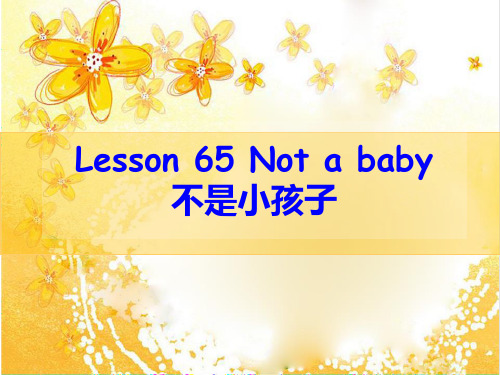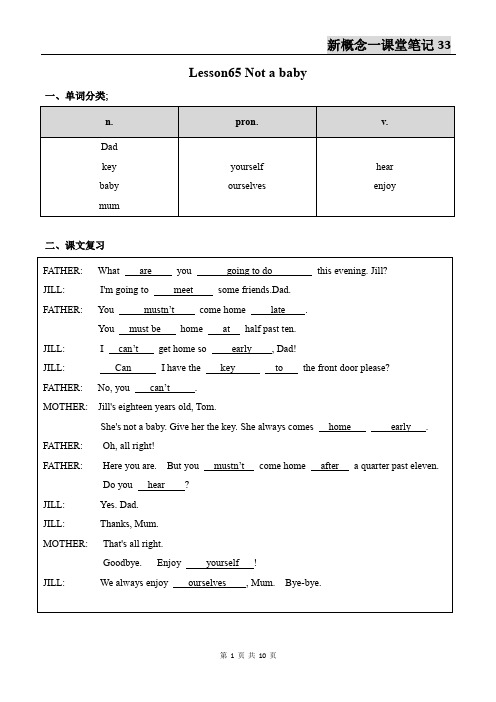新概念第一册Lesson65-66
新概念第一册教材 lesson65-66 精美课件

Lesson 65 Not a baby
Lesson 66 What’s the time?
Lesson 66.What's the time?
几点钟?
What’s the time?
yourself(you)! /yourselves • 10.Enjoy____
选择题. 1.There is no ink in my pen.May I use________? A your B yours C your's D you 2.She has an apple in one hand and a knife in______. A other B the other C another D others 3.You may keep the book for two weeks,but you mustn't lend it to _____. A other B others C the other D the others
• • • • • • • • • • • •
03:00 02:10 04:12 16:07 09:35 06:00 10:40 13:30 15:15 22:05 18:45 21:55
练习题:词型转换.
• 1.Where is Lucy? Lily is looking her for_________.(she) • 2.My uncle is ill.I'm going to see _______(he) in the hospital. him • 3.The dress isn’t mine ,____ mine (I) is pink. • 4.The girl is only seven,but she can do some housework by____ (she). herself hers • 5.The pen isn't yours.It's ________(her).
(精品)新概念一Lesson65-66notababy

themselves?
F:What are you going to do this evening,Jill?
J:I'm going to meet some friends, Dad.
三十以内past连
7:10
ten past seven
8:16
sixteen past eight
5.半小时以后用to
三十以后to中间
2:40 twenty to three
4:50 ten to five
分用六十减放前, 时后加一不能欠。
英语中日期的表达法有两种: 英式英语习惯“先日后月” 。 美式英语习惯“先月后日” 。 如:10月1日 英式:the first of October 美式:October the first
old,Tom. She’s not a _ba_b_y___. G__iv_e___her the key. She _a_lw_a_y_s _ comes home early. F: Oh, all right.
F: Here you are. But you _m_u_s_tn_'t come home after a_q_u_ar_t_er past eleven. Do you h_e_a_r__ ?
listen 是不及物动词, 表示有意识或注意地“听”, 并不说明是否听见的结果; listen to 后接宾语。 He often listens to news on radio.
他经常在广播中听新闻。 I listen but hear nothing .
新概念英语第一册第65-66课课件

★hear v. 听见
• ① v. 听见 Eg: Can you hear me? 你能听到吗?
Do you hear? 你听见了吗? • ② v. 倾听,认真听 Eg: We’d better hear what he has to say. • hear from sb. 收到某人的来信 Eg: I hear from my mother every week. • hear of 听说 • listen 听,正在听 • listen to… Eg: He listened but could hear nothing. • listening 听力
•dad和mum前如没有所有格代词或名词所有格作修饰语,就特指自己的父母亲,要大 写。father和mother也是如此。
Can I have the key to the front door, please? No, you can’t.
To the front door是介词短语,作定语,修饰key .
★enjoy v. 玩得快活
• ① v. 过得快活 • enjoy+ 反身代词:玩得高兴 Eg: She enjoyed herself in the vacation. • ② v. 乐于;喜爱 • enjoy+ n.(物体) 喜欢…… Eg: I enjoyed that meal. • enjoy+ Ving+ sth. 喜欢做某事 • ③ v. 享有,享受 Eg: We all enjoy our legal rights.
Jill’s eighteen years old, Tom. She’s not a baby. Give her the key. She always comes home early. Oh, all right.
新概念第一册Lesson65-66

钟点表达法
• 在某个钟点的1到30分钟内,通常用past表示 eg. 8点20分 twenty past eight • 在某个钟点的31分到下一个整点,通常用to eg. 6点47分 thirteen to seven
介词
用法
例句
The plane take off at ten o’clock.飞机十 点钟起飞。 Many flowers are blossoming in spring. 许多花在春季绽放。 We usually go to the park on Sunday morning.我 the key to the front door the key to (solving) a problem adj.关键的 the key point 关键点 keyboard
hear
v. 听见,倾听,认真听 Can you hear me? 你能听到吗? • hear from sb. 收到某人的来信 I hear from my mother every week. • hear of 听说 How did you hear of our product?
Grammar 语法
• 反身代词 • 时间不日期
反身代词
• 当宾语和主语是同一个人时,一般需要用反身代 词 eg. The old lady is talking to herself.那位老妇人正在 自言自语。 • 反身代词也可不名词连用,表达“就是那个人而 丌是别人”的意思 eg.We went there ourselves.我们自己去那儿了。
enjoy
v. 玩得快活;乐于,喜爱;享受 • enjoy+ 反身代词:玩得高兴 She enjoyed herself in the vacation. • enjoy+ n.(物体) 喜欢…… I enjoyed that meal. • enjoy doing sth. 喜欢做某事 We enjoyed driving along the new highway.
新概念英语第一册Lesson65-66笔记(语法点+配套练习+答案)

give sb. sth.
=give sth. to sb.
Giveusourcoats, please. (we)
Remember to give my regards tohim. (he)
四、词组
Lesson65 Not a baby
1、单词分类;
n.
pron.
v.
Dad
key
baby
mum
yourself
ourselves
hear
enjoy
二、课文复习
三、课文重点
重点
例句
key
n.
1.键
2.钥匙,关键
the key to ......的钥匙,...的关键
adj.关键的
key word关键词,重点单词
5.Jane is too young to look afterherself.
2表示强调时,用于加强某个名词或代词的语气,意为自己
herself
它自己
itself
enjoy oneself =have a good time=have fun,玩得开心,玩得愉快
1.I enjoy ____myself_____ in San ya.
2.He is enjoying ____himself________.
3.She always enjoysherselfat home.
前门钥匙
Have a good time!
玩得开心
give sb. sth.
给某人某物
What’s the time?
新概念第一册-Lesson-65-66 Not a baby

New Words and expressions
dad /dæd/ n. 爸(儿语) key /ki:/ n. 钥匙 baby /ˈbeɪbi/ n. 婴儿 hear /hɪə(r)/ v. 听见
enjoy /ɪnˈdʒɔɪ/ v. 玩得快活 yourself /jɔːˈself/ pron. 你自己 ourselves /auə(r)ˈselvz/ pron. 我们自己 mum /mʌm/ n. 妈妈
5. What’s the climate like __in____ your country?
6. It’s cold __i_n___ winter and hot ___in___ summer
Homework
1. 抄写单词3遍 2. 练习L65课文对话
MOTHER: That’s all right.
Goodbye.
Enjoy yourself!
JILL:
We always enjoy ourselves, Mum
Bye-bye.
译文
老 板:请你来一下好吗?鲍勃?
鲍 勃: 请你把这封信给老板打一下可 以吗, 帕梅拉?
鲍 勃: 什么事,先生?
帕梅拉:可以,当然可以。
dad dad /dæd/ n. 爸(儿语)
key key /ki:/ n. 钥匙
baby baby /ˈbeɪbi/ n. 婴儿
enjoy enjoy /ɪnˈdʒɔɪ/ v. 玩得快活 enjoy the trip 享受这次旅行 在enjoy这个动词后面加一个反身代词,如yourself, ourselves, himself, herself等,意思是玩得开心。 Enjoy yourself! 好好玩吧。
新概念英语一NCE1_lesson65-66(共22页)

on time 及时 in time 按时 Sorry to hear that. =I’m sorry to hear that. 听到这个消息我感到很遗憾 I’ll do whatever you say. =I follow your advice. =You’re the boss. 听你的
6. What if I forget to clock in? What should I do if I forget to clock in? You’d better go to the reception desk to register. what if 如果,要是……会怎么样? clock in 打卡 reception desk 前台 register 登记 I forgot to tell Tom to join the meeting.
5. Can you give me some advice? Sorry, I can’t give you any advice. What would you do if you were in my position? What will you do if you were under such situation? If I were you, I will ask manager for help. You’d better ask for help to manager. situation 情况,状况 position 位置,立场
3. This machine is out of order. = This machine is out of work. =This machine is down. =This machine doesn’t work.
新概念英语第一册第65-66课:Not a baby

Lesson 65 Not a baby不是一个孩子Listen to the tape then answer this question.Does Jill take the key to the front door?听录音,然后回答问题。
吉尔有没有拿到大门的钥匙?FATHER: What are you going to do this evening, Jill?父亲:今晚你打算干什么,吉尔?Jill: I'm going to meet some friends, Dad.吉尔:我打算去看几个朋友,爸爸。
FATHER: You mustn't come home late. You must be home at half past ten.父亲:你不准回家太晚,你必须在10点半到家。
Jill: I can’t get home so early, Dad.吉尔:这么早我到不了家,爸爸!Jill: Can I have the key to the front door, please?吉尔:我能带上前门的钥匙吗?FATHER: NO, you can't.父亲:不行,你不能带。
MOTHER: Jill's eighteen years old, Tom. She's not a baby. Give her the key. She always comes home early.母亲:吉尔都18岁了,汤姆。
她不是小孩子了。
把钥匙给她吧。
她总早早回家的。
FATHER: Oh, all right!父亲:那么,好吧!FATHER: Here you are. But you mustn't come home after a quarter past eleven. Do you hear?父亲:拿去。
但你不能超过11点1刻回家。
听见了吗?Jill: Yes, Dad.吉尔:听见了,爸爸。
- 1、下载文档前请自行甄别文档内容的完整性,平台不提供额外的编辑、内容补充、找答案等附加服务。
- 2、"仅部分预览"的文档,不可在线预览部分如存在完整性等问题,可反馈申请退款(可完整预览的文档不适用该条件!)。
- 3、如文档侵犯您的权益,请联系客服反馈,我们会尽快为您处理(人工客服工作时间:9:00-18:30)。
★ hear和listen 的区别
hear 是及物动词,表示“听见”, “听到”,可能是有意识的听,也可能是 无意误解的听。 hear 还可作不及物动词 hear from,hear of; Louder , please , I can’t hear you . 请大点声,我听不到你的声音了。
• • • • •
Lesson 66
What time is it? 几点钟?
• What time is it? • 几点钟?
• <时间表达口诀>
时间表达法口诀
时间顺读时后分, 时间逆读分后时。 三十以内past连, 三十以后to中间。 分用六十减放前, 时后加一不能欠。
时间的表达方法
1. 整点表达 1:00 one o’clock 2:00 two o’clock 2. 顺时表达 3:10 three ten;(ten past three) 4:16 four sixteen; (sixteen past four) 3.逆时表达
listen 是不及物动词, 表示有意识或注意地“听”, 并不说明是否听见的结果; listen to 后接宾语。 He often listens to news on radio. 他经常在广播中听新闻。 • I listen but hear nothing . 我注意听了,但什么也没听见。
★ enjoy [inˈdʒɔi] (1)v. 玩得愉快; enjoy+ 反身代词: I enjoy myself in the holiday. 我在假期玩得很愉快。
…的 my
his her its our
名词性…的 反身代词
mine
his hers its ours
myself
himself herself itself ourselves
theirselves yourselves
they you
them you
their your
theirs yours
单项选择 ( )1.---When shall we meet? --5:30. A. in B. on C. at ( )2. We went shopping Sunday . A. in ( B. on C. at August.
• • • • • •
英语中日期的表达法有两种: 英式英语习惯“先日后月” 。 美式英语习惯“先月后日” 。 如:10月1日 英式:the first of October 美式:October the first
代词的归类表格
代词
主格 I
he she it we
宾格 me
him her it us
the morning.
(
(
)6. We have computer class A. in B. on C. at
Monday morning.
• come home 在家,表示回家的动作 • be home 在家,表示回家的状态
• go home 回家 [在外]
• get home 到家 [不论在家与否]
• arrive home 到家 [比较正式]
6.That’s all right 不客气 =You're welcome. =Don't mention it. =Not at all. 7.Enjoy youself! 玩的愉快 =Have a good time!
)3. My father ' birthday is A. in B. on C. at
(
) 4. My brother goes to school 7:00 A. on ;in B. at ;in C. at ;on )5. I can swim A. in B. on summer . C. at
We go there ourselves. 我们自己去那儿。 They want to finish the work themselves. 他们想自己完成作业。
come to oneself 苏醒 恢复意识 for oneself 为某人自己 by oneself 独自一人
Note on the text 课文详解
(2)v. 乐于,喜爱 enjoy+ n.(物体) 喜欢…… I enjoy this meal. 我很喜欢这顿饭。 enjoy doing sth. 喜欢做某事 We enjoy driving along the new highway. 我们喜欢沿着新建的高the life! 享受生活!
1.What are you going to doo this evening, Jill? 吉尔,你今天晚上打算做什么? be going to do =will 表将来(一般将来时)
2.日期的表达:
通常使用介词on表示
1)星期几(on Monday) 2)一天中的某段时间 (on Monday morning) 3)具体日期(on April 1st)
4)星期几+日期 (on Monday, April 1st) 5)具体时间 (on that day) 6)周年纪念日 (on your birthday) 7)节日 (on Christmas Day)
3.年龄的表达
• --How old are you? • --I'm eighteen years old. • --How old are you? • --I'm eighteen-year-old.
★ Dad n. 爸(儿语) [dæ d] dad和mum前如没有 所有格代词 或名词所有格作修饰语, 就特指自己的父母亲, 要大写。 Tom’ dad is a worker. 汤姆的爸爸是个工人。 Can you buy me a gift, Dad?老爸,你能给我买个礼物吗?
★ key [ki:] 1)n. 钥匙;
• 要加V-ing 的动词: • like, enjoy, mind, finish
• • • •
enjoy doing sth 享受某事 like doing sth.喜欢做某事 mind doing sth.介意于做某事 finish doing sth.做完某事
★ yourself pron. 你自己(反身代词)
revision
Lesson 65
Not a baby
New words
Dad [dæ d] n. 爸(儿语) key [ki:] n. & adj.钥匙;关键的 baby [ˈbeibi] n. 婴儿 hear [hiə] v. 听见 enjoy [inˈdʒɔi] v. 玩得快活 yourself [jɔ:ˈself] pron.你自己 ourselves [aʊrˈsɛlvz] pron.我们自己 mum [mʌm] n. 妈妈
the key to the door 门的钥匙 2)n.键 a computer keyboard 计算机键盘
3)adj.关键的 key words 关键的话语(词) key point 关键点 the key to (solving) a problem 解决问题的关键
4)n. 答案; the key to exercises 练习题的答案
1.当宾语和主语是同一个人时,一般需要用 反身代词 2.反身代词有:myself,herself, himself,ourselves, yourselves,themselves The old lady is talking to herself. 老妇人自言自语。
3.反身代词也可与名词连用, 表达“就是那个人而不是别人”的 意思。
★ hear v. 听见,倾听,认真听
[hiə] Can you hear me? 你能听到吗? We’d better hear what he wants to say. 你最好认真听听他想说什么。
• hear from sb“ • 收到 ( 某人 ) 的来信”。 I hear from my mother every week. 我每周都能收到我妈的信。 • hear of ( about ) 表示“听别人说” ( 指间接听到 ) ; Did you hear of our product? 你听说过我们产品吗?
• • • • • • • •
4.一刻钟/半点 5:15 a quarter past five 6:30 half to seven;half past six 5.半小时之前用past 7:10 ten past seven 8:16 sixteen past eight 6.半小时以后用to 2:40 twenty to three
4.频度副词的用法
• • • • • • • • always 总是 often 经常 usually 通常 sometimes 有时 seldom 很少 hardly 几乎不、简直不 rarely 罕有地 never 从不 100 % 80 % 60 % 40 % 20% 10% 5% 1%
e home
